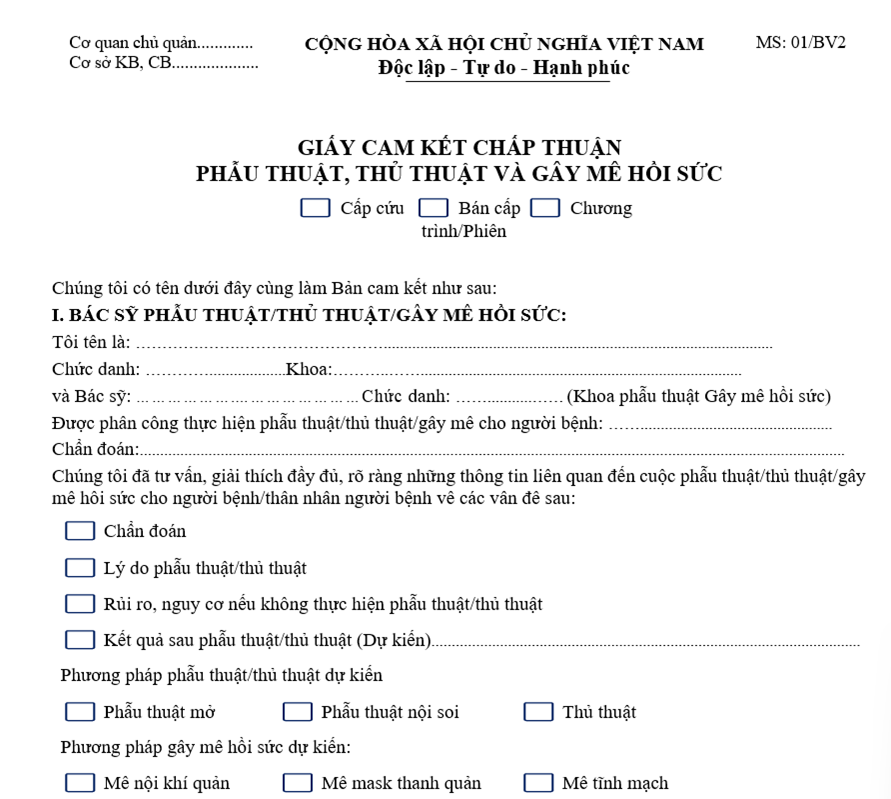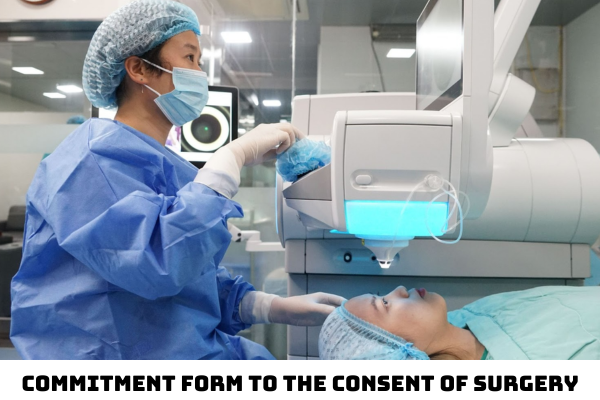Vietnam: Under Circular 32/2023/TT-BYT, what is the commitment form to the consent of surgery, invasive procedures, and resuscitation anesthesia (Form No. 01/BV2)?
- Under Circular 32/2023/TT-BYT, what is the commitment form to the consent of surgery, invasive procedures, and resuscitation anesthesia in Vietnam (Form No. 01/BV2)?
- Before surgical operations in Vietnam are performed, is consent from patients or their representatives required?
- What are the prohibited acts in healthcare services in Vietnam?
Under Circular 32/2023/TT-BYT, what is the commitment form to the consent of surgery, invasive procedures, and resuscitation anesthesia in Vietnam (Form No. 01/BV2)?
Under Form No. 01/BV2, Appendix XXIX issued together with Circular 32/2023/TT-BYT, the commitment form to the consent of surgery, invasive procedures, and resuscitation anesthesia in Vietnam is Form No. 01/BV2:

Download the commitment form to the consent of surgery, invasive procedures, and resuscitation anesthesia in Vietnam (Form No. 01/BV2): Here

Before surgical operations in Vietnam are performed, is consent from patients or their representatives required?
Under the provisions of Article 65 of the Law on Medical Examination and Treatment 2023 as follows:
Implementation of surgical and other invasive procedures
1. Surgical operations and other invasive procedures may be performed only after receiving the consent from patients or their representatives referred to in point a, b, c and d of clause 2 of Article 8 herein.
2. Surgical operations or other invasive procedures may be rendered to the patients who lose their capacity to perform civil acts; have difficulties in cognition, behavior control; have the limited capacity to perform civil acts; minor patients; the patients without families as specified in Article 15 herein.
According to the above regulations, surgical operations may be performed only after receiving consent from the patient or his/her representative who is:
- a person elected by an adult patient;
- a person chosen by a family member of the patient if the adult patient neither makes his/her own decision nor grants authorization before falling into a state of impaired or difficult cognition and behavior control;
- either his/her authorized representative or legal representative defined under the regulatory provisions of the Civil Code;
- a legal representative of a juridical person under the Civil Code, or the person assigned by a juridical person who is responsible for monitoring, care, custody, nursing or upbringing of that patient as per the Civil Code;
Surgical operations rendered to patients who lose their capacity to perform civil acts; have difficulties in cognition and behavior control; have the limited capacity to perform civil acts; minor patients; the patients without families shall comply with the provisions of Article 15 of the Law on Medical Examination and Treatment 2023.
What are the prohibited acts in healthcare services in Vietnam?
According to the provisions of Article 7 of the Law on Medical Examination and Treatment 2023, the prohibited acts in healthcare services in Vietnam are specified as follows:
Prohibited acts in healthcare services
1. Infringe patients’ rights.
2. Refuse or intentionally delay to refer patients to emergency care services, except as defined in Article 40 herein.
3. Carry out healthcare services that do not satisfy the conditions set out in Article 19 herein.
4. Deliver healthcare services that do not fall within the scope of practice or operation permitted by competent authorities, except in case of emergency care needed, or as these healthcare services are delivered under the mobilization or dispatch decisions of competent authorities in case of natural disaster, catastrophe, group-A infectious disease or state of emergency.
5. Practice medicine at the time or place which is not stated in the registration for practice of medicine, except as specified in clause 3 of Article 36 herein.
6. Fail to comply with regulations on professional and technical expertise in healthcare; use any professional method and technique, or medical equipment that has not been approved by competent authorities.
7. Prescribe medications that have not obtained marketing authorization as provided in law on pharmacy in healthcare.
8. Commit the act of harassment in the delivery of medical services.
9. Prescribe patients drugs, technical and medical equipment services; suggest referral to other medical establishments to patients, or commit other acts for personal gain.
10. Erase and tamper with medical records in order to falsify information on medical examination and treatment, or create fraudulent medical records or other documents showing medical examination and treatment results.
11. Any practitioner sells drugs in any form, except in the following cases:
a) Traditional medicine doctors, traditional medicine physician assistants or traditional medicine herbalists who sell traditional medications;
b) Holders of folk remedies who sell drugs prescribed according to folk remedies under their registered ownership.
12. Drink alcohols, beers and other alcoholic beverages; use narcotics; smoke tobaccos or cigarettes at medical establishments or while on duty.
13. Use any form of superstition in the distribution of medical services.
14. Refuse to participate in rendering medical services in case of a natural disaster, calamity, group-A infectious disease or a state of emergency according to the mobilization or dispatch decision of the competent body or person, except as defined under the regulatory provisions of point a and b of clause 3 of Article 47 herein.
15. Any medical establishment provides healthcare services if it
a) does not hold any operating license;
b) is under suspension of its operations;
c) delivers healthcare services that do not fall within the scope of permitted professional activities, except in case of emergency, or as these healthcare services are delivered under a mobilization or dispatch decision of the competent authority in response to a natural disaster, catastrophe, group-A infectious disease or state of emergency.
16. rents, borrows; leases or lends out practicing or operating licenses.
17. Misuse a practitioner's image and status to speak about, propagate and encourage patients to use unrecognized medical tests or therapies.
18. Infringe upon the life and health, or offend the honor and dignity, of practitioners and other people working at medical establishments, or damage or sabotage medical establishments’ property.
19. Prevent patients who are subject to the involuntary treatment requirement from entering medical establishments, or intentionally render involuntary treatment on people who are not subject to the involuntary treatment requirement.
20. Advertise beyond the scope of practice or professional activities approved by a competent authority; abuse medical knowledge to falsely advertise medical services.
21. Publish information not yet validated by competent authorities that medical incidents are ascribed to medical practitioners or medical establishments.
Thus, the prohibited acts in healthcare services in Vietnam are specified above.
LawNet